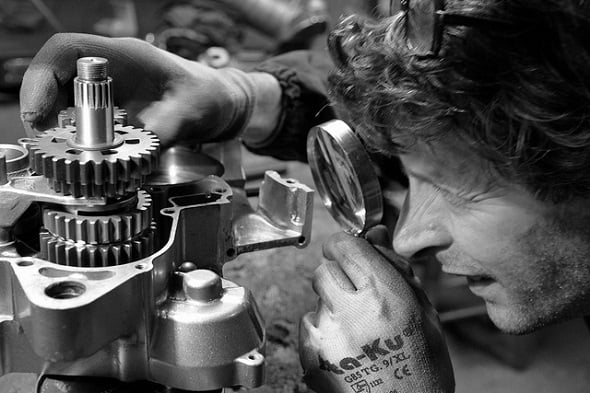While the latest trend states that content is a king (and it’s really so) and text still conveys the biggest amount of the information to the users, photography seems to be a growing point of interest of an internet society. Photographs are everywhere on the web – on local stores websites and big brands’ portals, on social media and private blogs.

With the technological development that makes purchasing a budget semi-professional camera affordable almost for any person it’s hard not to fall upon a massive trend and avoid the photography usage on the website design.
It’s no secret that web design and photography have a lot in common. The first reason that comes to the front is the massive use of photographs for website design. You hardly find a website without any photos on it. Photography is one of that significant elements that has one of the biggest impact on a human emotional state and evoke a burst of natural feelings. It helps creating a perfect atmosphere that paves the way for engagement with the brand.
The statistics claim that about 65% of people in the world are visual learners. Adding that pictures and photos are processed by human brain 60,000 times faster than text we get the conclusion that photos are the great and the powerful tool .
Web designers seem to nail that knowledge long time ago and make use of photography to create stunning websites. Moreover, many of web designers learn photography and use their own photos for projects. But are those all the benefits a web designer can get from learning photography? I bet not!
Web Designer Skills That May Be Learnt from Photographers
Photography is a great source of inspiration as well as professional tips for improving and enhancing web designer skills. A great amount of knowledge on composition, color, light and shadow theory may be learnt from photographers. Let’s find out what are the main photographers tricks web designers can take into account to implement in their routine.
Observation and Attention to Details
Photographers may spend hours in pursuit of a perfect shot. They are usually looking for a perfect point of view, evaluating an exposure, a perspective, light and composition. Photography process is a constant development and research. It includes a proper understanding of the intention of the shot and what emotion should it evoke.
Flickr – Francesco G.
Web designers should perfectly know the purpose of the website and what effect they need to achieve to attract visitors. This skill may be taken from the photographers ability to evaluate the scene and catch a perfect shot at the exactly right moment.
And the main thing – they pay extreme attention to the details. It’s no secret that any good photo contains a tiny element that makes it unique and special. Web designer that wants to create a good website should be very attentive to the details. It’s useful to find an element, a small detail that gives zest to the entire layout. Most designs are created around a certain element that may not seem the most important in terms of design structure, creates a focal point for a user.
Play with Light
Light is a main source of an image. Everything we see around we see thanks to the light. Photography works similarly to our eyes – the light is bounced off the objects in front of the camera, goes through the lenses, like it goes through the eye, and then sets onto a film or a sensor.
Light is a key element in photography. Properly used light may create a stunning image, give it a cool dramatic effect or add softness and tenderness to the pictured object. Vice versa, incogitant light settings may ruin the photo and make it a total waste.
In web design light and shadow become a cool way of creating a stylish layouts with cool accents on key elements. Flat design today makes heavy use of such a cool trend as long shadows. They provide depth and add vibrancy to icons (it’s where long shadows are used mostly). Interesting, that this effect was taken from photography where it is used for decades. It helps creating stunning effects and provide the photos with depth and drama.
Flickr – Leidorf
Learning the light and shadow interaction is vital for web designers. It allows better perceiving cool and warm edges of the light spectrum, properly choosing the balance between light and shadow.
Color The Life
Color is one of the key characteristics for any visual element. Our environment is full of colors and hues that affect our psychological and even physical state. Thus, careful selection of color palette is one of the main things a web designer should take care of. Properly selected colors impact visitor’s emotions, attention and attitude. They may raise brand awareness and draw a broad audience to the site.
Photographers are usually perfect with color handling. They properly understand how different colors of nature may appear on a photo and how they look on a monitor. Photographers have a right idea of a color combinations and their harmonious interactions.
Flickr – Workroom
All this knowledge may appear useful for web designers and teach them of selecting the right color scheme for a website. Learning photography may make web designer more sensitive to cooler and warmer tones of colors and more aware on selection of web-safe colors.
Black-and-white design as well as monochrome color palette are popular trends that emerged from photography and then migrated to the web design. Photographers usually take up black-and-white shots and sepia-toned pics to create a vintage effect and provide a look and feel of old photos to modern scenes. Such trends become highly popular due to their versatility and sophistication.
Flickr – Bill
Web designers introduce this approach to web designs to achieve an elegant look and evoke subtle emotions of harmony, tenderness and chic.
Allamardesign
Sense of Composition
This is another vital aspect that makes web design and photography a kin. Skilled photographers have a perfect sense of composition. In most cases well thought-out composition is a key characteristic that differs a work of art from an ordinary photo.
Most of experienced web designers use Golden Ratio principles in their works to make a perfect arrangement of the design elements. This ancient rule works perfectly for all visual arts for centuries and found its application to new fields like photography, cinema, web and graphic design.
Another composition trick that web designers can take from photography is the Rule of Thirds. It states putting main focal points onto imaginary intersections of two horizontal and two vertical lines that equally divide a picture area. This principle claims that placing a focus in the center of composition is too dull and boring while providing a bit of asymmetry to it makes a layout catchy and intriguing.
Flickr – Balsamia
The use of the Rule of Thirds in web design may deliver stunning results. It helps organizing layout without complex calculations and putting all the important info right into the visitor’s focus area.
Roger West
Get Trendy
Photographers today are closely connected with the Internet and design audience. They learn all latest trends and sometimes may even predict the new ones. Web designers that understand inner processes of the photography world may sense these groundbreaking tendencies and implement them first.
With a growing quality of the photos large sized pics become highly popular. So large photography backgrounds are a huge trend today. We may spot a great interest to galleries and sliders that allow showcasing their works not only for photographers. Elegance of black-and-white photography forced a trend of monochrome and retro-styled designs.
Koga
However, the story behind the trends may appear tricky. Their nature is complicated and sometimes it’s hard to say whether this or that trend emerged in photography and then transformed in web design style or was it quite the opposite. The fact is that creative fields doesn’t develop in a vacuum. They interact and influence each other. And due to such impact we get new tendencies, new discoveries that force us move forward.

